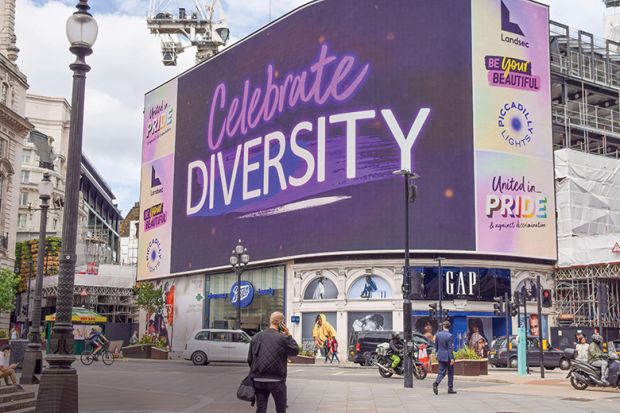These days, criticising diversity, never mind positing its decline, is like disputing the laws of gravity. Diversity is universally endorsed from CEOs to police chiefs and seen as the barometer of a progressive, tolerant and even prosperous society.
Take London, for example, a city that contributes a quarter of the UK’s economic output. This metropolitan superpower was built on banking and a growing population of kaleidoscopic diversity. According to Ben Judah’s This is London (2016), during the last 40 years the percentage of white Britons living in London has fallen from 86 per cent to 45 per cent; the number of Africans living in the capital would fill a city the size of Sheffield. This is progress writ large.
So diversity is a reality and a positive force. But in his latest book, Russell Jacoby seems to be saying: “Newton and your Law of Universal Gravitation – be damned.”
Anybody who is familiar with his earlier books and journalistic writings – he is a professor of history at the University of California, Los Angeles – will know that Jacoby has iconoclastic form. The Last Intellectuals: American Culture in the Age of Academe (1987) was influential in stoking the debate about the demise of the public intellectual – and it also directed critical ire against the modern university. Think of it as a modern reboot of Julien Benda’s 1928 book The Treason of the Intellectuals. Elements of The Last Intellectuals and its indictment of the academic industry also feature in Jacoby’s latest book.
As in earlier works such as The Last Intellectuals, but also The End of Utopia: Politics and Culture in the Age of Apathy (1999) and Bloodlust: On the Roots of Violence from Cain and Abel to the Present (2011), he continues to write prose that is sharp, readable and displays an ever-present caustic wit. On Diversity is not written to be read and discussed just by fellow scholars (Jacoby would be horrified by this review), but aimed at a general readership.
The range of issues and subjects covered is typically, well, diverse: languages, childhood and play, the environment and fashion are all tackled in its assault on the “cult of diversity”. Jacoby also eschews the current scholarship and research on diversity that has become an academic growth industry. Instead, he relies more on the wisdom of great thinkers and writers from the past – Alexander von Humboldt, William James, Stefan Zweig and Walter Benjamin all feature in his attempt to challenge the modern infatuation with diversity.
So how does Jacoby navigate this scepticism towards the relentless celebration of diversity – a sensitive and much cherished credo to attack in the 21st century? He is not against diversity per se but critical of diversity as an ideology – the new opiate of the masses. As an ideology, it offers “a consumer notion of diversity”, where more is better. This consumerist slant on diversity, Jacoby writes, treats “culture as an empty vessel that can be filled by language or religion or food. Like cereal boxes in a supermarket aisle, all varieties happily coexist.” His book attempts to defend “individual, not group, diversity” – it is an apologia for individual idiosyncrasy, for the unconventional, even for eccentricity.
Jacoby warns us that his criticism of diversity should not be misconstrued – this is delicate territory for a critic and sceptic. He knows that to “criticize diversity is to invite ostracism”, as well as potential charges of racism or even reactionary populism. If the “choice is between the KKK’s white supremacy and Bank of America’s diversity,” he explains, “I stand with the Bank of America; and sometimes this is the choice”. But even when there’s Hobson’s choice – and there rarely is, notes Jacoby – between virulent racism and vacuous diversity, “criticism of the latter should not cease”. Why? Because the modern diversity project proposes a narrowing of political vision, an enfeebling of radical ambitions – it devitalises or rather homogenises diversity.
Take the issue of increasing minority and gender diversity in organisations. The demand for improved representation of minorities in society is compelling. But Jacoby questions whether such interventions ultimately result in “more diversity…it is almost the reverse”. The legitimate demand being made by “most outside groups clamoring for representation – is to join the mainstream and enjoy its benefits”. So how different and diverse are these groups, asks Jacoby, if they all share the same desires and aims? It seems everybody, regardless of background, is seeking a place at the table – not to create a new setting.
This cultural and social homogenisation, for Jacoby, has birthed the modern secular religion of diversity. For “as people become less culturally different, they fetishize their differences”. Ultimately, we may differ in pose but resemble each other in fact: “We diverge in lifestyle and converge in life.”
The decline of diversity, the book argues, is empirically verifiable across various domains, from university education to children’s experience. Even popular music is becoming less diverse. There is also the decline of biodiversity. The “dwindling environmental variety” is a reflection of, and indeed caused by, the decline of human diversity, since the former is driven by massification and the standardisation of production across different economic sectors.
The forces of globalisation and Americanisation are to blame for the relentless march of uniformity. The latter half of the book laments how these global forces are the “slaughter benches” on which individuality is sacrificed. Here, On Diversity certainly doesn’t suffer from what C. S. Lewis called “chronological snobbery” – the idea that the thinking of the past is inherently inferior to that of the present. Jacoby revisits major thinkers from the past, specifically John Stuart Mill and Alexis de Tocqueville, to reclaim the value of the individual as the irreducible ground of diversity. This foray into the 19th century reveals how the individual in the 21st century is susceptible to being swallowed up by the masses.
These later chapters make for more humdrum reading – they offer familiar (though no less justifiable) warnings and complaints. The critique here also seems one-dimensional, lacking insight into how individuality and democracy can be protected against the forces of uniformity and the bland enticements of diversity. Jacoby acknowledges the way forward is not clear and that his book has been more an exercise in pessimism of the intellect rather than optimism of the will. But there are occasional glimpses as to what we might do. Jacoby insists all the mainstream solutions on offer, especially from the high priests of diversity, only seek to ameliorate the system. What needs to happen instead, he argues, is real transformation – but around what issues exactly?
Early in the book Jacoby raises the spectre of accelerating economic inequalities. He cites Thomas Piketty’s Capital in the Twenty-First Century (2014), only to summarily dismiss him as someone who only offers new tax schemes as a solution. This dismissal is a missed opportunity: Piketty’s claims about patrimonial capitalism and his insistence that past and current wealth will devour the future is something that offers a distinctive rallying cry. It could be adopted not only by Jacoby but also the vast disenfranchised 99 per cent – whatever their cultural differences and diversities.
Michael Marinetto is reader in management at Cardiff University.
On Diversity: The Eclipse of the Individual in a Global Era
By Russell Jacoby
Seven Stories Press, 240pp, $17.95
ISBN 9781644210765
Published 9 December 2021
The author
Russell Jacoby, professor of history at the University of California, Los Angeles, was born in New York but moved to the suburbs, he says, when his “parents joined the post-Second World War tidal wave out of the city. I attended public schools and then the universities of Chicago, Wisconsin and Rochester…I belong to the leftist 1960s generation, but always possessed what might be dubbed an allergy to political dogmatism.”
It was “a few refugee scholars at Wisconsin”, Jacoby goes on, who “redoubled my scepticism of leftist pieties, as did Christopher Lasch at Rochester, who became my thesis adviser, and wrote the introduction to my first book, Social Amnesia: A Critique of Conformist Psychology [1975]. That book dealt in part with the cheap criticism that dispatched Freud as hopelessly 19th century, as if intellectual progress were automatic.”
In several of his books, Jacoby has called into question what he calls “the intellectual advances that have been trumpeted on campuses”. The Last Intellectuals: American Culture in the Age of Academe (1987), for example, “wondered about the success of leftists in the universities. In the 1950s, the number of radical sociologists or economists in higher ed could be counted on two hands, at least in the States; by the 1980s, the numbers stretched into the thousands. But what was their reach or impact?”
A more critical approach to “the latest intellectual seduction”, in Jacoby’s view, would have clear financial advantages because “the diversity cause has become a bloated industry with endless administrators, officers and compulsory programmes”. But there would also be a gain in “intellectual honesty”: “it is assuredly just to seek to increase representation of under-represented groups in higher ed (or anywhere). But what does that have to do with diversity? Are individuals just agents of groups? If we get more African American astrophysicists, does astrophysics become more diverse? Only in the most superficial sense.”
Matthew Reisz
POSTSCRIPT:
Print headline: Diversity: it’s all the same to me
Register to continue
Why register?
- Registration is free and only takes a moment
- Once registered, you can read 3 articles a month
- Sign up for our newsletter
Subscribe
Or subscribe for unlimited access to:
- Unlimited access to news, views, insights & reviews
- Digital editions
- Digital access to THE’s university and college rankings analysis
Already registered or a current subscriber?










